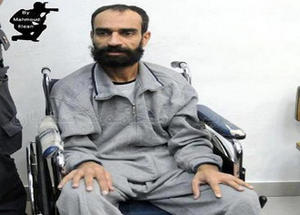Hunger striking Palestinian detainee, Samer Al-Eesawy, was sentenced Thursday by the Israeli District Court in Jerusalem to 8 months imprisonment starting from the date of his arrest on July 7, 2012. Al-Eesawy is still facing the possibility of a long-term imprisonment that could be instated by the Israeli Military Court.The decision to sentence him to eight months does not necessarily mean that he will be released as the Israeli Military Court in Ofer still has “pending charges” against him.
The rulings of the District Court are separate from the Military Court as the detainee is illegally being prosecuted in two different courts on the same charges.
Thursday’s ruling was made during a hearing session in which the prosecution demanded sentencing Al-Eesawy to 10-24 years.
Article #186 of Israeli Military order #1651 regarding the cancellation of early releases of Palestinian detainees, allows a special military committee headed by military judges to re-arrest Palestinian detainees who were released under the prisoner-swap deal of October 2011.
Israel allows the re-arrest of detainees under the claim that they violated the terms of their release, therefore, the special committee can demand reinstating the original sentence. In Al-Eesawy’s case, the sentence is 20 years.
Head of the Legal Unit at the Palestinian Prisoners Society (PPS) Jawad Boulos, stated that the prosecution’s demand had no legal grounds, and added that the Israeli prosecutor “only presented vindictive claims that had no justification or legal grounds”.
The detainee started his strike after Israeli soldiers kidnapped him in direct violation of the Prisoner Swap deal that secured his release, last year, along with more than a 1000 detainees in return for the release of Israeli soldier, Gilad Shalit, who was captured by the resistance in Gaza in June of 2006.
The PPS reported that Al-Eesawy will not stop his hunger strike despite his deteriorating health condition.
Head of the Legal Unit of the PPS, Qaddoura Fares, stated that the Israeli court ruling is a proof that “Israel is run by gangs, each gang has its own rules and regulations that have no legal grounds”.
Fares added that this ruling is a serious precedent especially since the Israeli army insists on filing charges against Al-Eesawy at the Ofer military court with the intention of sentencing him to 30 years, as he was serving this term when he was released under the prisoner swap deal, and the prosecution wants to illegally reinstate the ruling.
Al-Eesawy was kidnapped and imprisoned by Israel 4 times and spent a total of 12 years in Israeli prisons.

